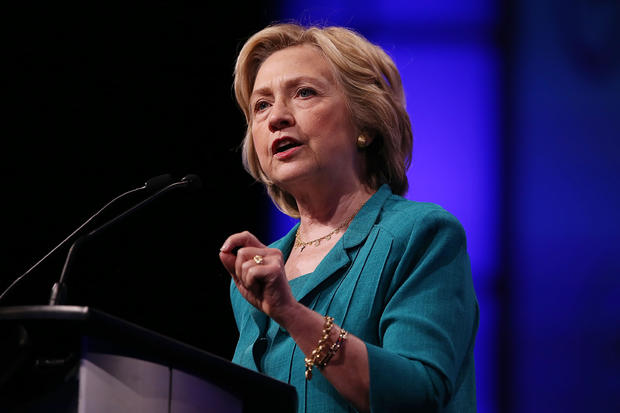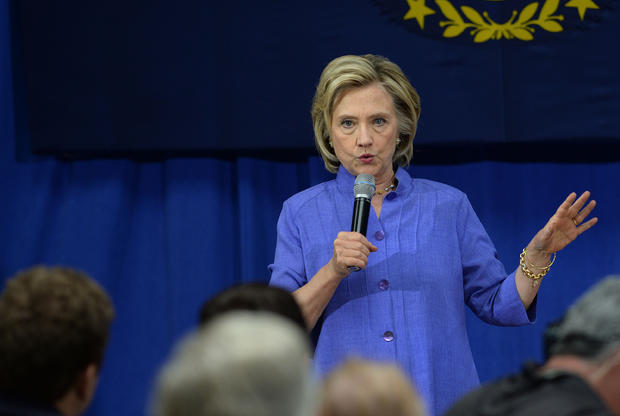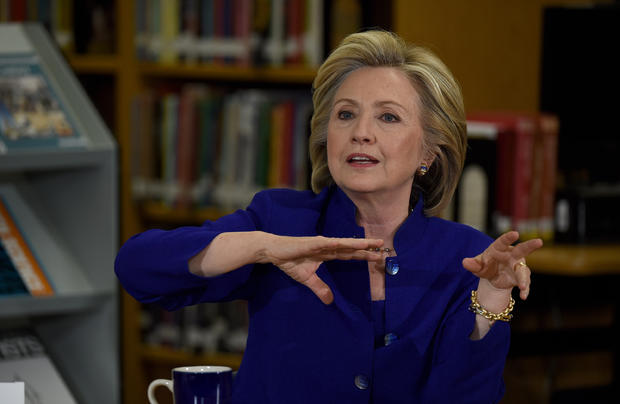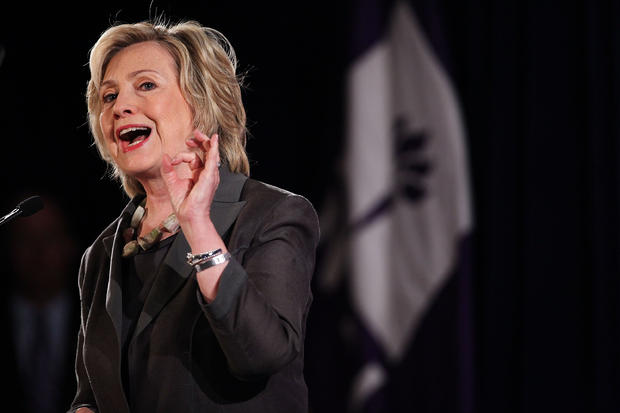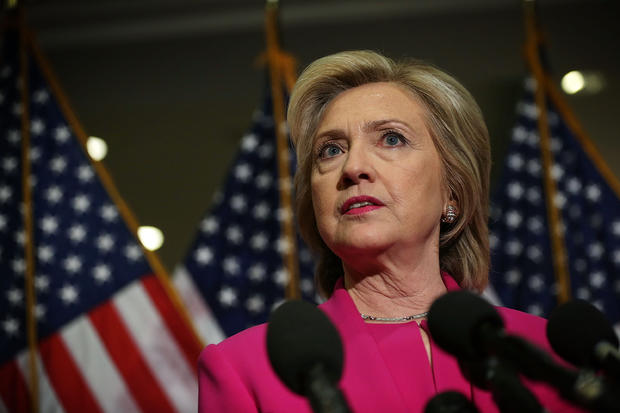Hillary Clinton: What does she stand for?
Despite some restless energy on the left and some emerging signs of strength from her Democratic competitors, Hillary Clinton remains the odds-on favorite to be the Democratic Party's presidential nominee in 2016.
So what will she do if she wins the White House?
On domestic policy, Clinton has struck a decidedly populist tone, emphasizing issues like college affordability, income inequality, and workplace policy reform to demonstrate her attention to Americans' basic economic concerns. She's stood behind the Affordable Care Act, arguing the Republicans would undo a law that's extended health insurance coverage to millions. And she's talking tough on Wall Street, accusing the GOP of having "mass amnesia" about the financial deregulation that preceded the last recession.
"Everyday Americans need a champion," she memorably said when she launched her campaign in April, "and I want to be that champion."
Her approach to economic issues like Wall Street reform and to social issues like gay rights and criminal justice reform is considerably more progressive than that pursued by her husband, former President Bill Clinton, during the 1990s - a fact that may have more to do with the passage of time than anything else.
On foreign policy, she's generally stood behind the record of President Obama, whom she served as secretary of state. She backs the nuclear deal with Iran and the U.S. rapprochement with Cuba, for example. But she's also outlined some differences with Mr. Obama, notably on the question of whether the U.S. should arm Syrian rebels fighting Islamic extremists and a repressive central government.
While her campaign risks getting sidetracked by the continued focus on her use of a private email server as secretary of state, which has generated an avalanche of GOP attacks on her character and judgment, it's obvious Clinton's team would rather focus on her policy proposals. In the months since she announced her bid, she's delivered substantive speeches on green energy, higher education reform, foreign policy, and criminal justice reform, to name just a few.
With that in mind, here's a look at what Hillary Clinton stands for.
Education
Clinton rolled out her "new college compact" in August, pledging to increase college affordability and ease the burden of student loans for those who have already graduated.
"College is supposed to help people achieve their dreams. But more and more, paying for college actually pushes those dreams further and further out of reach. That is a betrayal of everything college is supposed to represent," she said when she rolled out the plan in New Hampshire.
The $350 billion college tuition plan would enable students to attend a four-year public college without taking out loans for tuition. Community college would be tuition-free. Clinton would use a $200 billion federal incentive system to give grants to states that promise to offer no-loan tuition at four-year public colleges and universities, and free community college tuition.
People would be able to use Pell Grants to pay for living expenses instead of tuition. For those who take out loans to go to a private college and university, Clinton said the government would cut interest rates so it doesn't profit from repayments.
She would pay for the plan in part by capping itemized tax deductions at 28 percent for the wealthiest Americans.
Those who are now repaying student loans would be allowed to refinance at lower rates, and Clinton says she would expand programs that calculate rates of repayment based on people's incomes.
Immigration
Since her 2008 presidential campaign, Clinton has said that people who came to the U.S. illegally should be able to apply for citizenship if they fulfill certain criteria like paying back taxes and a fine and learning English. She also voted in favor of the comprehensive immigration bill endorsed by former President George W. Bush in 2007.
She's attacked proposals from some Republicans that would grant residency -- but not citizenship -- to some undocumented immigrants living in the U.S. "When they talk about legal status, that is code for second class status, and we should never forget who this debate is about," she said in May. "People who work hard, who love this country, who pay taxes to it, and want nothing more than to build a good future for themselves and their children."
Clinton has voiced support for President Obama's controversial executive actions that deferred deportation first for people brought to the country illegally as children, and then the parents of children who are U.S. citizens or lawful permanent residents. During her speech in May, she promised to "do everything possible under the law to go even further" - not necessarily by creating another broad category of deportation deferrals, but creating an easier way for people to make the case that they should be allowed to stay.
"I want to make this a voting issue. I want people when they go to vote for Congress, for the Senate, for president, they're thinking about, will this support comprehensive immigration reform with a path to citizenship. Right now none of the leading Republicans support that," Clinton told Univision in an August interview. She said the way to get Congress to pass comprehensive immigration reform - which died after making it through the Senate in 2013 - is to elect more Democrats.
Clinton has also weighed in recently on sanctuary cities -- places where local authorities do not cooperate with federal immigration authorities. She criticized the city of San Francisco for failing to deport Mexican immigrant Francisco Lopez-Sanchez, a convicted felon who had been deported to Mexico five times. He allegedly shot and killed a San Francisco woman named Kathryn Steinle earlier this summer.
A spokesperson for Clinton's campaign said she "believes that sanctuary city policies can help further public safety" as long as there aren't cases in which people "fall through the cracks."
The economy
Seeking to tap into populist frustration with the growing income inequality in the United States, Clinton has billed herself as the champion of everyday Americans.
She wants to raise the federal minimum wage and encourage state and local governments to do so as well. She wants to invest in an infrastructure bank to create jobs, and she also supports immigration reform because of its potential to boost economic growth. Clinton has also spoken broadly about expanding the workforce, particularly for women, through public and private investments and better benefits, and she wants to make the tax code more "balanced."
To increase incomes for working Americans, Clinton has said she would offer companies a 15 percent tax credit if they agree to distribute a percentage of their business profits to workers.
"Credible studies prove that profit-sharing with your employees is good for the employees, good for the businesses, and good for the economy. I want to incentivize more companies to do just that," she said. "It makes good business sense. It increases productivity, and it increases loyalty of employees."
Another proposal would reform the capital gains tax to push companies to make long-term investments.
Social issues
Clinton is a staunch supporter of abortion rights, telling voters on the campaign trail she'll defend "a woman's right to choose." As a senator, she voted against legislation banning partial-birth abortions and a law requiring parental consent when a minor is transported across state lines for an abortion. Clinton also opposes a ban on abortions after 20 weeks of pregnancy, saying it would conflict with the Roe v. Wade decision.
Despite the recent controversy surrounding Planned Parenthood, she has stood by the organization and lashed out at Republicans who are seeking to put it out of business.
In an online video released in August, she said, "Republicans like Scott Walker and Jeb Bush are calling to defund Planned Parenthood, the country's leading provider of reproductive health care. And they are joined by Republicans in Congress, who will not waste a minute in voting to make that happen."
Like many Democrats, her position on same-sex marriage has evolved over the last decade and a half. Clinton once said marriage did not include gay couples (though said they should receive benefits) and only backed the idea of civil unions during the 2008 Democratic primary. She came out in favor of same-sex marriage in 2013.
When the Supreme Court legalized same-sex marriage in 2015, Clinton said she was "celebrating" the victory.
"But we know that the struggle for LGBT rights doesn't end with today's triumph," she said. "For too many LGBT Americans who are subjected to discriminatory laws, true equality is still just out of reach. While we celebrate today, our work won't be finished until every American can not only marry, but live, work, pray, learn and raise a family free from discrimination and prejudice. We cannot settle for anything less."
Foreign policy
On her campaign website, Clinton lays out her philosophy on foreign affairs: "The world isn't simple," the website says. "But it holds far more opportunities than threats if we exercise bold and confident leadership that lets us shape global events rather than be shaped by them."
She lists four priorities in this arena: Prevent a nuclear Iran, defeat the Islamic State of Iraq and Syria, hold China accountable, and stand up to Russian President Vladimir Putin.
Clinton supports the nuclear deal that the Obama administration and other nations negotiated with Iran, calling it "the most effective path of all the alternatives available to the U.S. and our partners to prevent Iran from acquiring a nuclear weapon." She argued last month that signing the agreement would be "just the beginning" and that her years as the nation's top diplomat gives her the experience needed to successfully enforce the deal.
At an event in Manchester, New Hampshire earlier this week, Clinton said that if the Iran deal isn't approved, "all bets are off" -- and it would hurt the United States' standing with China and Russia. As secretary of state in 2010, "I went to work to persuade Russia, China to stand with us on international sanctions at the U.N.," she said. If the agreement isn't approved, "the Europeans, the Russians, the Chinese, they're gonna say we agreed with the Americans, I guess their president can't make foreign policy," Clinton continued. "That's a very bad signal to send."
Clinton's critics say she's already proven that she's a poor negotiator, slamming her failed effort to "reset" U.S.-Russia relations in President Obama's first term. Clinton has since said she is skeptical of Russian President Vladimir Putin and has come down hard on China for cyber attacks against the U.S.
As for ISIS, Clinton told Univision this week that the extremist group is "a real threat" and "something that we've got to stand up to." Clinton has stressed the need to dismantle ISIS's Internet presence. However, she told Univision, "I will not put American troops on the ground to fight ISIS, unlike Jeb Bush who seems to imply in his remarks that that's exactly what he would do."
Bush, in a speech Tuesday, blamed the "Obama-Clinton" foreign policy for the rise of ISIS, slamming the president and former secretary of state for pulling U.S. troops out of Iraq. Clinton has pointed out that former President George W. Bush left in place an agreement with Iraq to remove those troops.
She has blamed the rise of ISIS on the "terrible turmoil in Syria," and she's actually voiced some reservations about the Obama administration's approach to the Syrian civil war. "I personally had advocated that we do more to help the rebels against [Syrian dictator Bashar] Assad because I worried that terrorists would take and occupy territory, and that has come to pass," she told Univision.
